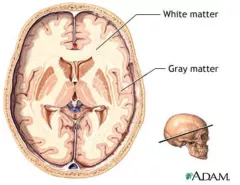Topics
Inappropriate cellular response to stress linked to a new neurological disorder

An international team led by researchers at the Baylor College of Medicine and Texas Children’s Hospital in collaboration with the Undiagnosed Diseases Network have identified gene variants in the EIF2AK family of kinases leads to previously unidentified neurodevelopmental disorders - in which inappropriate response to stress (such as fever triggered by viral infections) triggers degeneration of the nerve fibers connecting major brain regions, collectively known as the white matter.
This is the first study to demonstrate that variants in EIF2AK1 and EIF2AK2 result in neurologic disorders characterized by delayed development, white matter alterations, and neurologic regression. Identification of these gene variants offers a better understanding of the role of white matter in brain development and function and opens the possibility of diagnosing and developing novel therapies for other patients with similar clinical findings. The study appears in the American Journal of Human Genetics.
“Our teams are interested in the genetic causes of complex childhood neurological conditions, many of which have no definite diagnosis and limited treatments. In particular, little is known about the etiology and pathogenesis of devastating white matter disorders,” said one of the senior authors of the study, Dr. Hsiao-Tuan Chao, child neurologist and investigator at the Jan and Dan Duncan Neurological Research Institute (NRI) at Texas Children’s Hospital, assistant professor at Baylor College and McNair Scholar at the Robert and Janice McNair Foundation. Other senior authors involved in the study include Dr. Hugo J. Bellen, professor at Baylor College, Howard Hughes Medical Institute and NRI investigator, Dr. Pankaj Agrawal from Boston Children’s Hospital and Dr. Jonathan A. Bernstein from Stanford University.
“The study was initiated when three individuals with a strikingly similar history of disease onset – dramatic loss of motor and cognitive skills following high fever and viral illnesses – presented at Texas Children’s Hospital,” said first author Dr. Dongxue Mao, postdoctoral fellow at the NRI. “With the help of our colleagues at Texas Children’s, the UDN, and others through the online tool GeneMatcher, we identified eight individuals who had similar clinical findings and an individual with progressive limitations in ambulation. The children exhibited developmental delays, abnormal muscle tone, impairments in cognitive skills, speech and motor movements. MRI imaging of their brains and spinal cords showed alterations in the white matter that affected regions of the brain crucial for motor function, coordination, and cognition.”
To identify the specific genetic change responsible for these findings, the researchers compared the exomes (i.e. the protein-coding part of the genome) of the affected children and their parents – they found that eight individuals with delayed development and neurologic regression in the setting of febrile illnesses had single base pair changes in the EIF2AK2 gene and the individual with progressive loss of ambulation had a single base pair chain in the EIF2AK1 gene. All of these changes were not found in the parents’ DNA, suggesting they were generated spontaneously in the DNA of the affected individuals.
EIF2AK1 and EIF2AK2 are members of the Eukaryotic Translation Initiation Factor 2 Alpha Kinase (EIF2AK) family. The EIF2AK family members protect mammalian cells during stressful conditions such as viral infections, low oxygen or nutrients, accumulation of toxic free radicals, unfolded proteins, activation of oncogenes and others. In these situations, cells initiate an integrated stress response (ISR) whose primary mission is to conserve precious cellular resources.
To determine if the newly identified variants in EIF1AK family affect the cell’s response to stress, the scientists tested the effect of the variants in both human-derived cell lines and skin cells from the affected individuals.
“Under normal circumstances, EIF1AK1 and EIF2AK2 regulate the integrated stress response by modulating the function of a protein called the Eukaryotic Translation Initiation Factor 2 subunit (EIF2S1). EIF2S1 then modulates the activity of the EIF2B complex. However, we discovered that in EIF2AK1 and EIF2AK2 variants, the activity of this pathway was impaired,” Mao said.
“Interestingly, variants in genes encoding subunits of the EIF2B complex are also associated with a similar neurological condition called Childhood Ataxia with Central Nervous System Hypomyelinating / Vanishing White Matter (CACH/VWM) that is characterized by progressive neurologic decline following febrile illnesses and other stressors. The overlapping pattern of disease onset and symptoms suggest variants in EIF2AK family likely employ similar disease-causing mechanisms that perturb the brain’s white matter,” explained Chao.
“As a neurologist, it was incredibly meaningful to solve these medical mysteries and to provide a definitive genetic diagnosis to these patients and their parents, who were anxious to know the reason for their child’s neurologic decline. Having this diagnosis will help affected families connect and support each other through this difficult journey,” Chao said.
“Our findings open new molecular approaches to deal with devastating white matter diseases. By understanding how EIF2AK1 and EIF2AK2 dysfunction affects brain development and function, we and other scientists will be able to develop better diagnostics, prognostics, and improved therapeutic interventions for the affected children in the future,” Bellen said.
Other contributors to this work include Chloe M. Reuter, Maura R.Z. Ruzhnikov, Anita E. Beck, Emily G. Farrow, Lisa T. Emrick, Jill A. Rosenfeld, Katherine M. Mackenzie, Laurie Robak, Matthew T. Wheeler, Lindsay C. Burrage, Mahim Jain, Pengfei Liu, Daniel Calame, Sébastien Küry, Martin Sillesen, Klaus Schmitz-Abe, Davide Tonduti, Luigina Spaccini, Maria Iascone, Casie A. Genetti, Mary Kay Koenig, Madeline Graf, Alyssa Tran, Mercedes Alejandro, Undiagnosed Diseases Network, Brendan H. Lee, Isabelle Thiffault, Pankaj B. Agrawal, Jonathan A. Bernstein.
The authors are affiliated with one or more of the following institutions: Stanford University; Boston Children’s Hospital; Harvard Medical School; University of Washington, Seattle; Children’s Mercy Hospital; University of Missouri-Kansas City, Kennedy Krieger Institute, Centre Hospitalier Universitaire de Nantes, France; Buzzi Children’s Hospital, Milan; Laboratorio di Genetica Medica, ASST Papa Giovanni XXIII, Bergamo; University of Texas Health Sciences Center at Houston, and Copehagen University Hospital.
See the publication for a complete list of the sources of support for this work.




